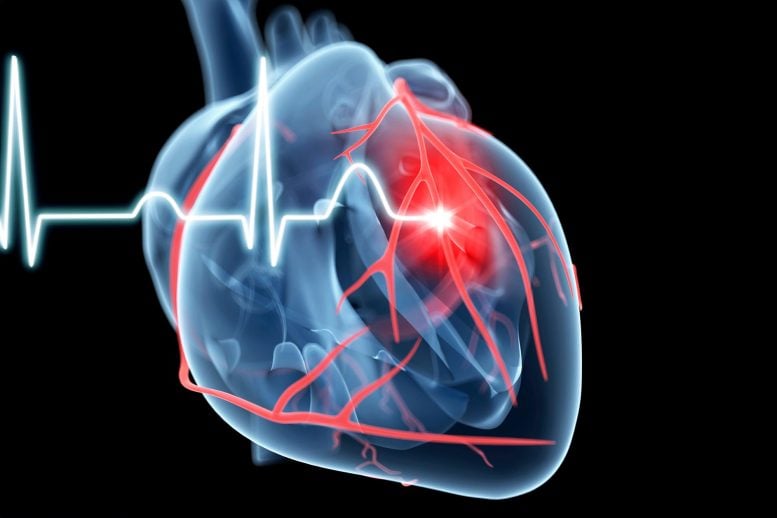
Job strain and effort-reward imbalance at work were associated with a greater chance of developing an abnormal heart rhythm condition, finds a new study in the Journal of the American Heart Association.
- Adults in white-collar jobs in Canada with high job strain and for whom significant efforts are met with low rewards (such as low salary or recognition) may face a 97% increased risk for developing the irregular heart rhythm condition known as atrial fibrillation, or AFib or AF, compared to workers not exposed to these work stressors.
- Separately, high job strain alone was associated with an 83% higher risk of developing AFib, and effort-reward imbalance alone was associated with a 44% greater risk.
- Recognizing and addressing these stressors at work may be an effective strategy to prevent atrial fibrillation in adults, scientists said.
Work Stress and Atrial Fibrillation Risk
Work-related stress caused by job strain and an imbalance between efforts applied vs. rewards received may increase the risk of developing atrial fibrillation, according to new research published today (August 14) in the Journal of the American Heart Association, an open-access, peer-reviewed journal of the American Heart Association.
Also known as AFib or AF, atrial fibrillation is the most common form of arrhythmia – an abnormal heart rhythm. It can lead to stroke, heart failure, or other cardiovascular complications. More than 12 million people are projected to have AFib in the United States by 2030, according to the American Heart Association’s 2024 heart disease and stroke statistics.
Psychosocial Stressors in the Workplace
Previous research linked high job strain and effort-reward imbalance at work with an increased risk of coronary heart disease. This research is the first to examine the adverse effect of both psychosocial stressors at work on atrial fibrillation, said the study’s senior author Xavier Trudel, Ph.D., an occupational and cardiovascular epidemiologist and associate professor at Laval University in Quebec City, Quebec, Canada.
“Our study suggests that work-related stressors may be relevant factors to include in preventive strategies,” Trudel said. “Recognizing and addressing psychosocial stressors at work are required to foster healthy work environments that benefit both individuals and the organizations where they work.”
The Impact of Job Strain
Trudel and team studied the impact of job strain, which refers to a work environment in which employees face high job demands, such as a heavy workload and tight deadlines, and low control over their work with little say in decision-making and how they execute their tasks.
Another factor assessed in the study was the effort-reward imbalance. This occurs when employees invest significant effort into their work but perceive the rewards they get in return — such as salary, recognition or job security — as insufficient or unequal to their performance.
Key Findings From the Study
Researchers examined medical database records for nearly 6,000 adults in white-collar jobs in Canada, with 18 years of follow-up data. The analysis found that:
- Employees who said they experienced high job strain had an 83% higher risk of developing AFib compared to workers unaffected by the stressors.
- Those who perceived an effort-reward imbalance had a 44% greater risk, compared to workers who did not report this imbalance.
- Combined perceptions of high job strain and effort-reward imbalance were associated with a 97% increased risk of AFib.
Investigating Workplace Interventions
“The effectiveness of workplace interventions to reduce psychosocial stressors that may also reduce the risk of AFib should be investigated in future research efforts,” Trudel said. “Our research team previously conducted an organizational intervention designed to reduce psychosocial stressors at work, which was shown to effectively reduce blood pressure levels. Examples of organizational changes implemented during the intervention included slowing down the implementation of a large project to prevent increased workload; implementing flexible work hours; and holding meetings between managers and employees to discuss day-to-day challenges.”
Study Limitations and Design
Limitations of the study include that participants were all white-collar workers encompassing managers, professional and office workers in Canada which means results may not apply to other types of workers or to workers in other countries.
Study details, background, and design:
- Researchers collected data through the PROspective Quebec (PROQ) Study on Work and Health, which started in the Quebec region in 1991-1993 and recruited white-collar workers from 19 public and semi-public organizations.
- A total of 5,926 workers (49% men, 51% women) were included in this analysis. Their average age was 45 at the beginning of the study (1999-2001) and 65 at the end of the follow-up (Dec. 2018). Most study participants were white adults.
- Work stress was assessed from self-reported questionnaires.
- The analysis identified 186 AFib cases, and among that group, 19% of the people with AFib reported high job strain; 25% said they perceived effort-reward imbalance; and 10% reported experiencing both stressors simultaneously.
- More than one-third of participants had been diagnosed with coronary heart disease or heart failure before their AFib incidence.
- The study measured the work-related stressors through self-reported questionnaires specifically on job strain and effort-reward imbalance, controlling for a broad list of socioeconomic characteristics (sex and education), health risks (diabetes status and high blood pressure), and lifestyle factors (smoking and alcohol).
Reference: “Psychosocial Stressors at Work and Atrial Fibrillation Incidence: An 18‐Year Prospective Study” by Edwige Tiwa Diffo, Mathilde Lavigne‐Robichaud, Alain Milot, Chantal Brisson, Mahée Gilbert‐Ouimet, Michel Vézina, Denis Talbot and Xavier Trudel, 14 August 2024, Journal of the American Heart Association.
DOI: 10.1161/JAHA.123.032414